Organisational Coaching & Mentoring: Skills, Behaviours and Resilience
VerifiedAdded on 2023/06/16
|12
|3823
|57
Report
AI Summary
This report provides a comprehensive analysis of coaching and mentoring within an organizational context. It begins by outlining the similarities and differences between coaching and mentoring, contrasting them with other learning interventions such as team development and training programs. The report assesses the necessary skills and behaviors for effective coaching and mentoring, including active listening, building trust, managing risks, and providing corrective feedback. Furthermore, it explores the crucial role of coaching and mentoring in building resilience among employees and helping them navigate organizational change, emphasizing the importance of relaxation techniques, positive thinking, and learning from past mistakes. The report concludes by highlighting the tangible and intangible benefits of coaching and mentoring, underscoring their significance in fostering employee development and organizational success.
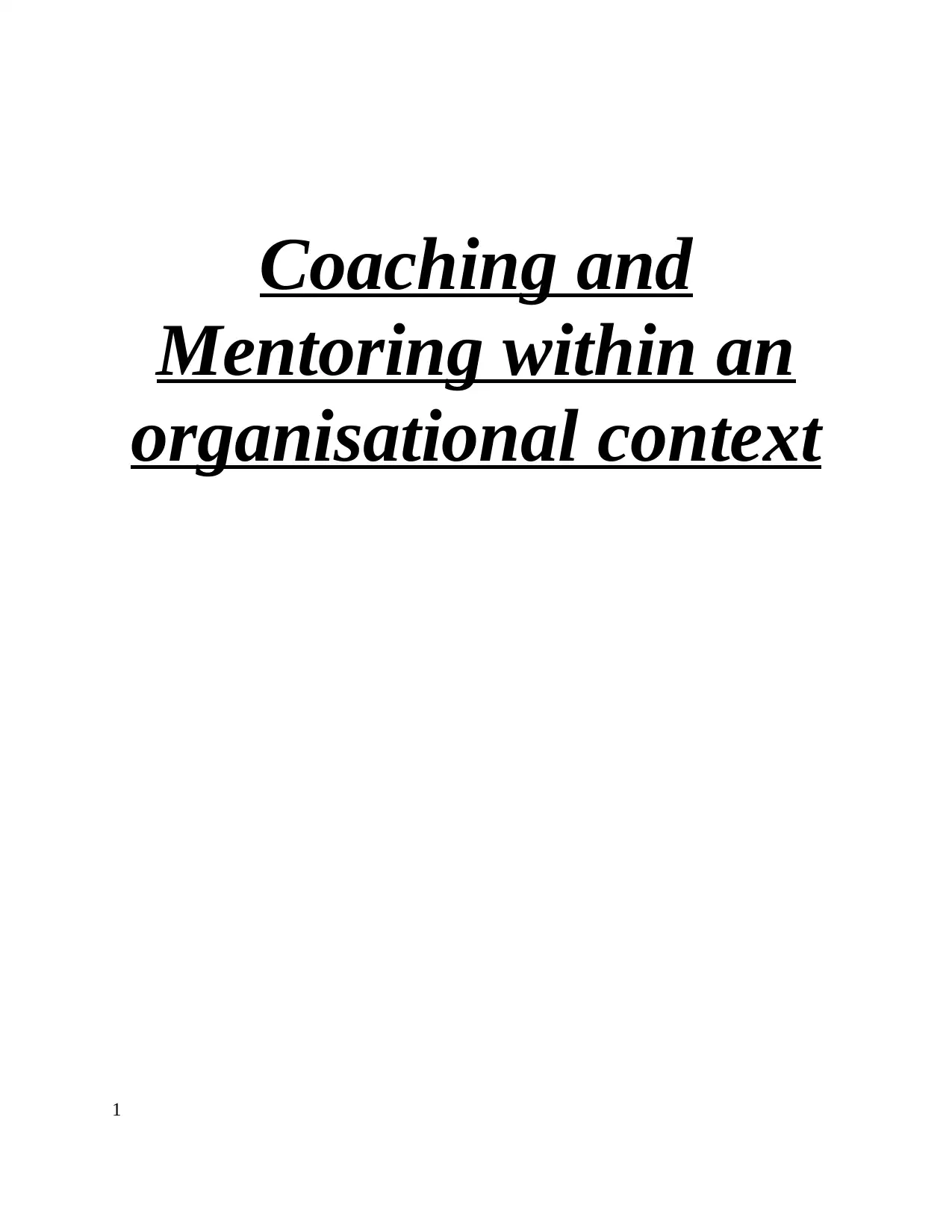
Coaching and
Mentoring within an
organisational context
1
Mentoring within an
organisational context
1
Paraphrase This Document
Need a fresh take? Get an instant paraphrase of this document with our AI Paraphraser
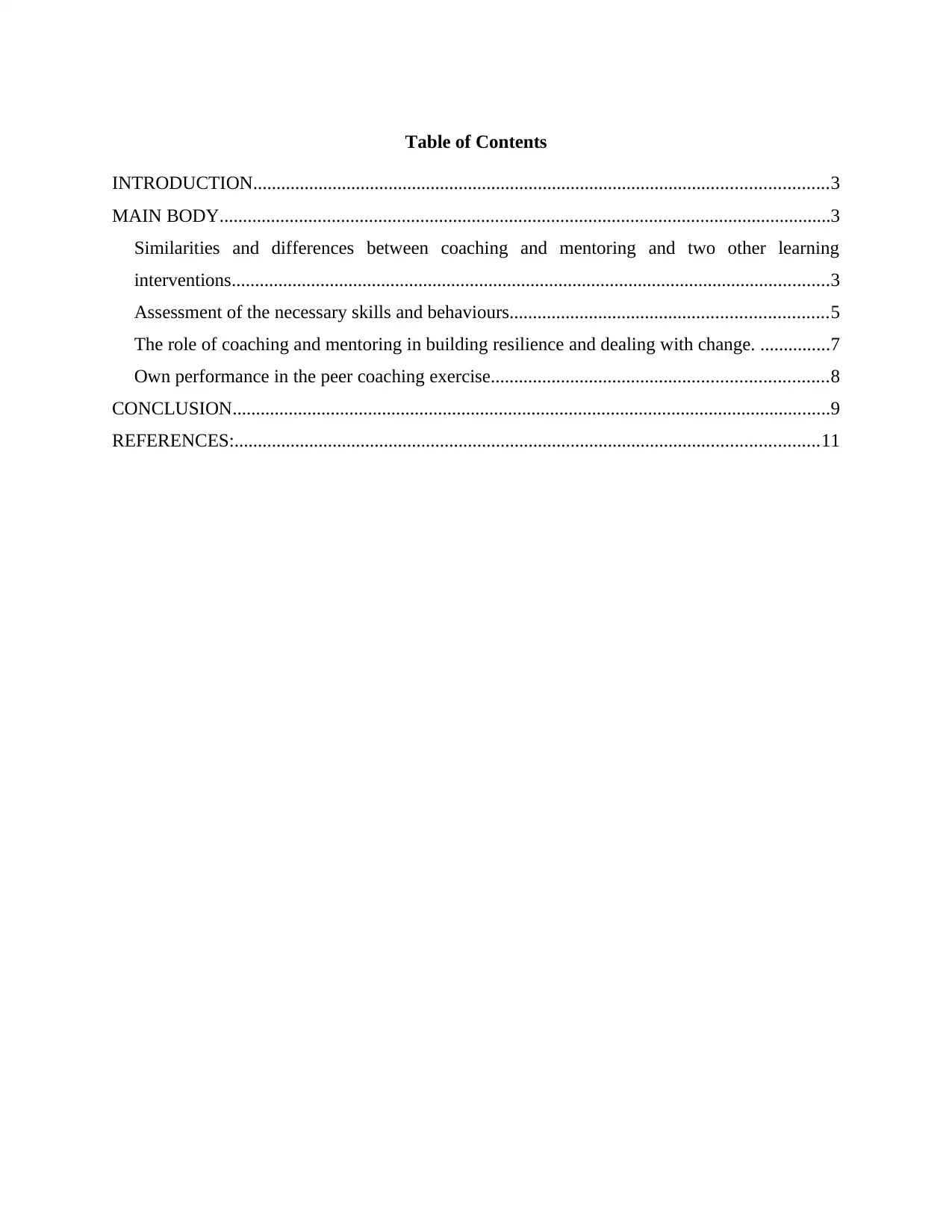
Table of Contents
INTRODUCTION...........................................................................................................................3
MAIN BODY...................................................................................................................................3
Similarities and differences between coaching and mentoring and two other learning
interventions................................................................................................................................3
Assessment of the necessary skills and behaviours....................................................................5
The role of coaching and mentoring in building resilience and dealing with change. ...............7
Own performance in the peer coaching exercise........................................................................8
CONCLUSION................................................................................................................................9
REFERENCES:.............................................................................................................................11
INTRODUCTION...........................................................................................................................3
MAIN BODY...................................................................................................................................3
Similarities and differences between coaching and mentoring and two other learning
interventions................................................................................................................................3
Assessment of the necessary skills and behaviours....................................................................5
The role of coaching and mentoring in building resilience and dealing with change. ...............7
Own performance in the peer coaching exercise........................................................................8
CONCLUSION................................................................................................................................9
REFERENCES:.............................................................................................................................11
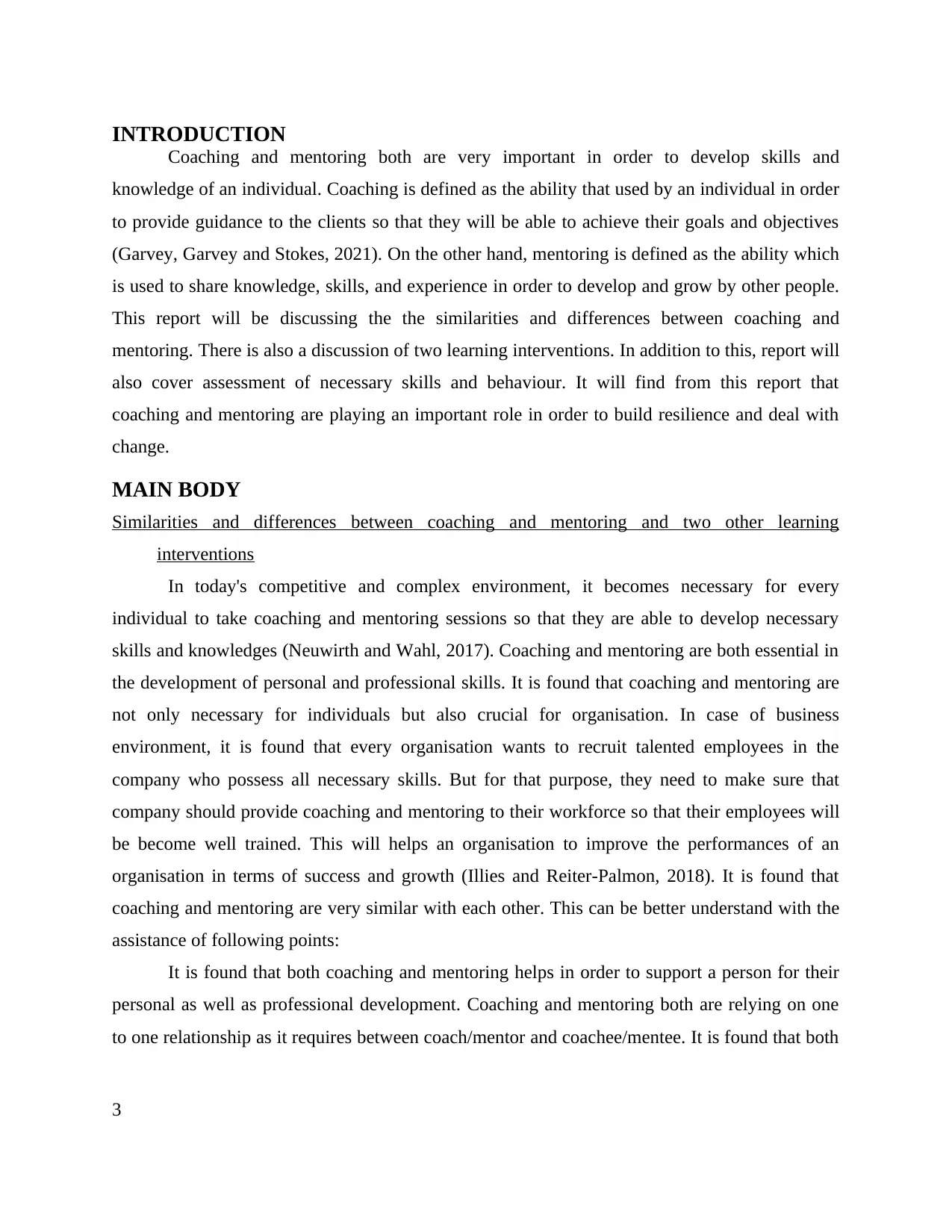
INTRODUCTION
Coaching and mentoring both are very important in order to develop skills and
knowledge of an individual. Coaching is defined as the ability that used by an individual in order
to provide guidance to the clients so that they will be able to achieve their goals and objectives
(Garvey, Garvey and Stokes, 2021). On the other hand, mentoring is defined as the ability which
is used to share knowledge, skills, and experience in order to develop and grow by other people.
This report will be discussing the the similarities and differences between coaching and
mentoring. There is also a discussion of two learning interventions. In addition to this, report will
also cover assessment of necessary skills and behaviour. It will find from this report that
coaching and mentoring are playing an important role in order to build resilience and deal with
change.
MAIN BODY
Similarities and differences between coaching and mentoring and two other learning
interventions
In today's competitive and complex environment, it becomes necessary for every
individual to take coaching and mentoring sessions so that they are able to develop necessary
skills and knowledges (Neuwirth and Wahl, 2017). Coaching and mentoring are both essential in
the development of personal and professional skills. It is found that coaching and mentoring are
not only necessary for individuals but also crucial for organisation. In case of business
environment, it is found that every organisation wants to recruit talented employees in the
company who possess all necessary skills. But for that purpose, they need to make sure that
company should provide coaching and mentoring to their workforce so that their employees will
be become well trained. This will helps an organisation to improve the performances of an
organisation in terms of success and growth (Illies and Reiter-Palmon, 2018). It is found that
coaching and mentoring are very similar with each other. This can be better understand with the
assistance of following points:
It is found that both coaching and mentoring helps in order to support a person for their
personal as well as professional development. Coaching and mentoring both are relying on one
to one relationship as it requires between coach/mentor and coachee/mentee. It is found that both
3
Coaching and mentoring both are very important in order to develop skills and
knowledge of an individual. Coaching is defined as the ability that used by an individual in order
to provide guidance to the clients so that they will be able to achieve their goals and objectives
(Garvey, Garvey and Stokes, 2021). On the other hand, mentoring is defined as the ability which
is used to share knowledge, skills, and experience in order to develop and grow by other people.
This report will be discussing the the similarities and differences between coaching and
mentoring. There is also a discussion of two learning interventions. In addition to this, report will
also cover assessment of necessary skills and behaviour. It will find from this report that
coaching and mentoring are playing an important role in order to build resilience and deal with
change.
MAIN BODY
Similarities and differences between coaching and mentoring and two other learning
interventions
In today's competitive and complex environment, it becomes necessary for every
individual to take coaching and mentoring sessions so that they are able to develop necessary
skills and knowledges (Neuwirth and Wahl, 2017). Coaching and mentoring are both essential in
the development of personal and professional skills. It is found that coaching and mentoring are
not only necessary for individuals but also crucial for organisation. In case of business
environment, it is found that every organisation wants to recruit talented employees in the
company who possess all necessary skills. But for that purpose, they need to make sure that
company should provide coaching and mentoring to their workforce so that their employees will
be become well trained. This will helps an organisation to improve the performances of an
organisation in terms of success and growth (Illies and Reiter-Palmon, 2018). It is found that
coaching and mentoring are very similar with each other. This can be better understand with the
assistance of following points:
It is found that both coaching and mentoring helps in order to support a person for their
personal as well as professional development. Coaching and mentoring both are relying on one
to one relationship as it requires between coach/mentor and coachee/mentee. It is found that both
3
⊘ This is a preview!⊘
Do you want full access?
Subscribe today to unlock all pages.

Trusted by 1+ million students worldwide
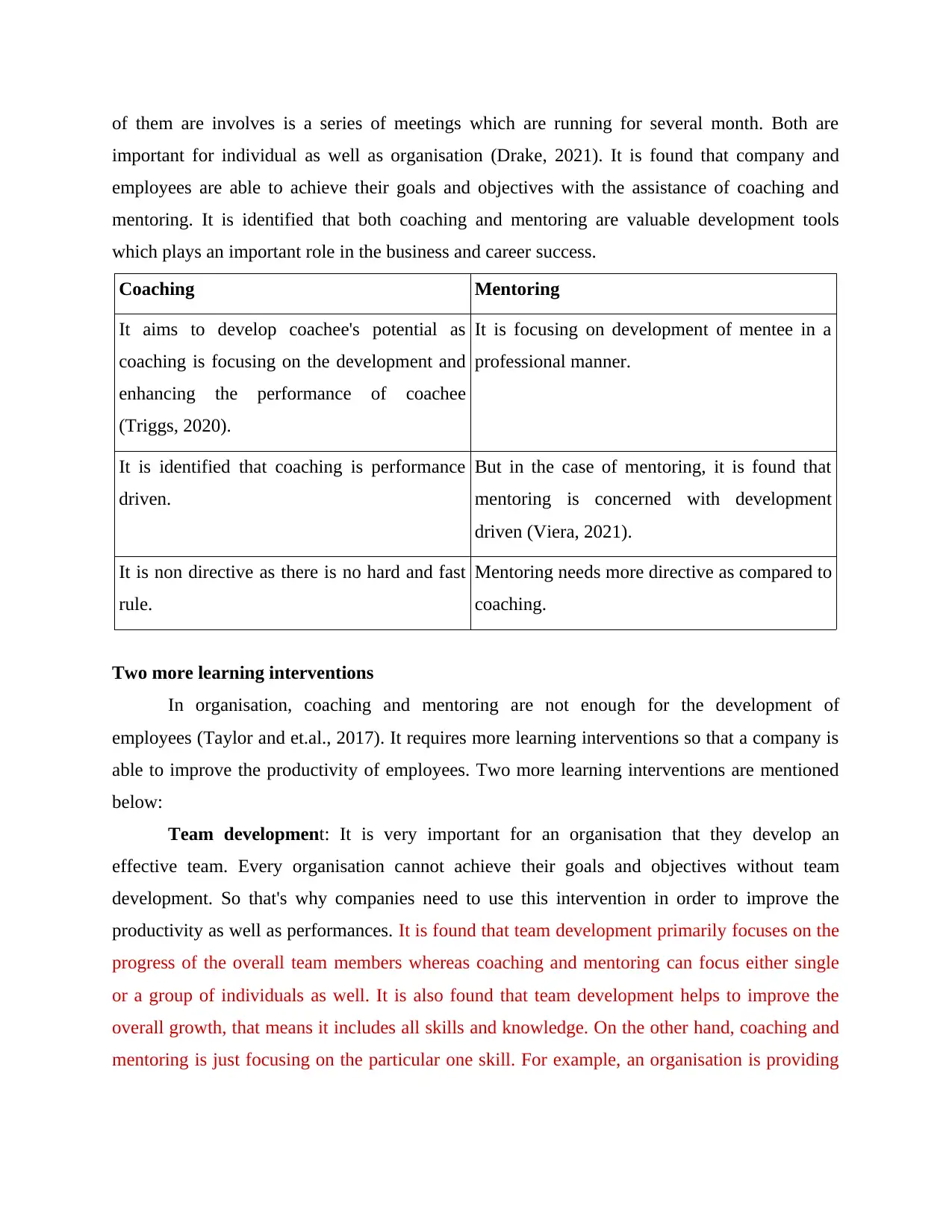
of them are involves is a series of meetings which are running for several month. Both are
important for individual as well as organisation (Drake, 2021). It is found that company and
employees are able to achieve their goals and objectives with the assistance of coaching and
mentoring. It is identified that both coaching and mentoring are valuable development tools
which plays an important role in the business and career success.
Coaching Mentoring
It aims to develop coachee's potential as
coaching is focusing on the development and
enhancing the performance of coachee
(Triggs, 2020).
It is focusing on development of mentee in a
professional manner.
It is identified that coaching is performance
driven.
But in the case of mentoring, it is found that
mentoring is concerned with development
driven (Viera, 2021).
It is non directive as there is no hard and fast
rule.
Mentoring needs more directive as compared to
coaching.
Two more learning interventions
In organisation, coaching and mentoring are not enough for the development of
employees (Taylor and et.al., 2017). It requires more learning interventions so that a company is
able to improve the productivity of employees. Two more learning interventions are mentioned
below:
Team development: It is very important for an organisation that they develop an
effective team. Every organisation cannot achieve their goals and objectives without team
development. So that's why companies need to use this intervention in order to improve the
productivity as well as performances. It is found that team development primarily focuses on the
progress of the overall team members whereas coaching and mentoring can focus either single
or a group of individuals as well. It is also found that team development helps to improve the
overall growth, that means it includes all skills and knowledge. On the other hand, coaching and
mentoring is just focusing on the particular one skill. For example, an organisation is providing
important for individual as well as organisation (Drake, 2021). It is found that company and
employees are able to achieve their goals and objectives with the assistance of coaching and
mentoring. It is identified that both coaching and mentoring are valuable development tools
which plays an important role in the business and career success.
Coaching Mentoring
It aims to develop coachee's potential as
coaching is focusing on the development and
enhancing the performance of coachee
(Triggs, 2020).
It is focusing on development of mentee in a
professional manner.
It is identified that coaching is performance
driven.
But in the case of mentoring, it is found that
mentoring is concerned with development
driven (Viera, 2021).
It is non directive as there is no hard and fast
rule.
Mentoring needs more directive as compared to
coaching.
Two more learning interventions
In organisation, coaching and mentoring are not enough for the development of
employees (Taylor and et.al., 2017). It requires more learning interventions so that a company is
able to improve the productivity of employees. Two more learning interventions are mentioned
below:
Team development: It is very important for an organisation that they develop an
effective team. Every organisation cannot achieve their goals and objectives without team
development. So that's why companies need to use this intervention in order to improve the
productivity as well as performances. It is found that team development primarily focuses on the
progress of the overall team members whereas coaching and mentoring can focus either single
or a group of individuals as well. It is also found that team development helps to improve the
overall growth, that means it includes all skills and knowledge. On the other hand, coaching and
mentoring is just focusing on the particular one skill. For example, an organisation is providing
Paraphrase This Document
Need a fresh take? Get an instant paraphrase of this document with our AI Paraphraser
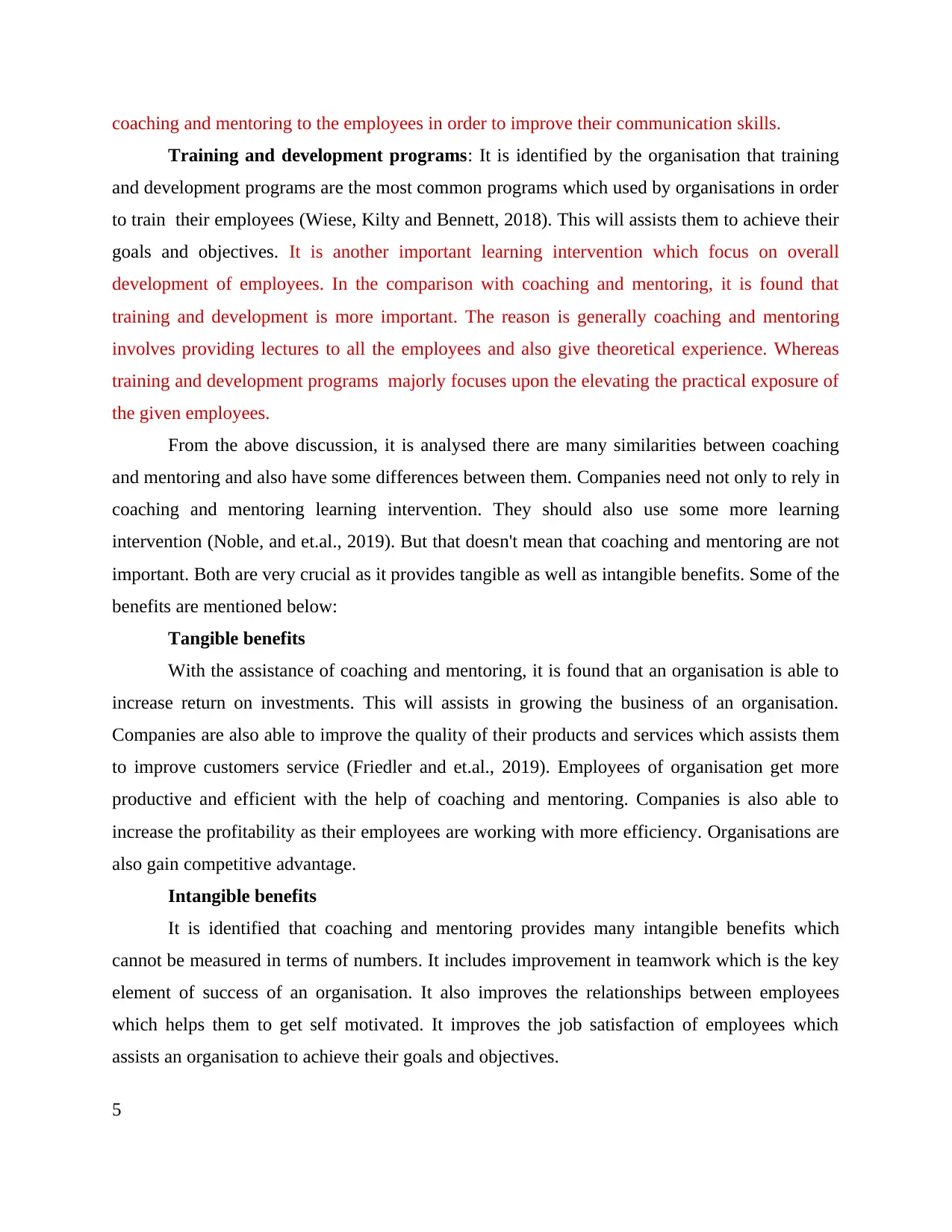
coaching and mentoring to the employees in order to improve their communication skills.
Training and development programs: It is identified by the organisation that training
and development programs are the most common programs which used by organisations in order
to train their employees (Wiese, Kilty and Bennett, 2018). This will assists them to achieve their
goals and objectives. It is another important learning intervention which focus on overall
development of employees. In the comparison with coaching and mentoring, it is found that
training and development is more important. The reason is generally coaching and mentoring
involves providing lectures to all the employees and also give theoretical experience. Whereas
training and development programs majorly focuses upon the elevating the practical exposure of
the given employees.
From the above discussion, it is analysed there are many similarities between coaching
and mentoring and also have some differences between them. Companies need not only to rely in
coaching and mentoring learning intervention. They should also use some more learning
intervention (Noble, and et.al., 2019). But that doesn't mean that coaching and mentoring are not
important. Both are very crucial as it provides tangible as well as intangible benefits. Some of the
benefits are mentioned below:
Tangible benefits
With the assistance of coaching and mentoring, it is found that an organisation is able to
increase return on investments. This will assists in growing the business of an organisation.
Companies are also able to improve the quality of their products and services which assists them
to improve customers service (Friedler and et.al., 2019). Employees of organisation get more
productive and efficient with the help of coaching and mentoring. Companies is also able to
increase the profitability as their employees are working with more efficiency. Organisations are
also gain competitive advantage.
Intangible benefits
It is identified that coaching and mentoring provides many intangible benefits which
cannot be measured in terms of numbers. It includes improvement in teamwork which is the key
element of success of an organisation. It also improves the relationships between employees
which helps them to get self motivated. It improves the job satisfaction of employees which
assists an organisation to achieve their goals and objectives.
5
Training and development programs: It is identified by the organisation that training
and development programs are the most common programs which used by organisations in order
to train their employees (Wiese, Kilty and Bennett, 2018). This will assists them to achieve their
goals and objectives. It is another important learning intervention which focus on overall
development of employees. In the comparison with coaching and mentoring, it is found that
training and development is more important. The reason is generally coaching and mentoring
involves providing lectures to all the employees and also give theoretical experience. Whereas
training and development programs majorly focuses upon the elevating the practical exposure of
the given employees.
From the above discussion, it is analysed there are many similarities between coaching
and mentoring and also have some differences between them. Companies need not only to rely in
coaching and mentoring learning intervention. They should also use some more learning
intervention (Noble, and et.al., 2019). But that doesn't mean that coaching and mentoring are not
important. Both are very crucial as it provides tangible as well as intangible benefits. Some of the
benefits are mentioned below:
Tangible benefits
With the assistance of coaching and mentoring, it is found that an organisation is able to
increase return on investments. This will assists in growing the business of an organisation.
Companies are also able to improve the quality of their products and services which assists them
to improve customers service (Friedler and et.al., 2019). Employees of organisation get more
productive and efficient with the help of coaching and mentoring. Companies is also able to
increase the profitability as their employees are working with more efficiency. Organisations are
also gain competitive advantage.
Intangible benefits
It is identified that coaching and mentoring provides many intangible benefits which
cannot be measured in terms of numbers. It includes improvement in teamwork which is the key
element of success of an organisation. It also improves the relationships between employees
which helps them to get self motivated. It improves the job satisfaction of employees which
assists an organisation to achieve their goals and objectives.
5
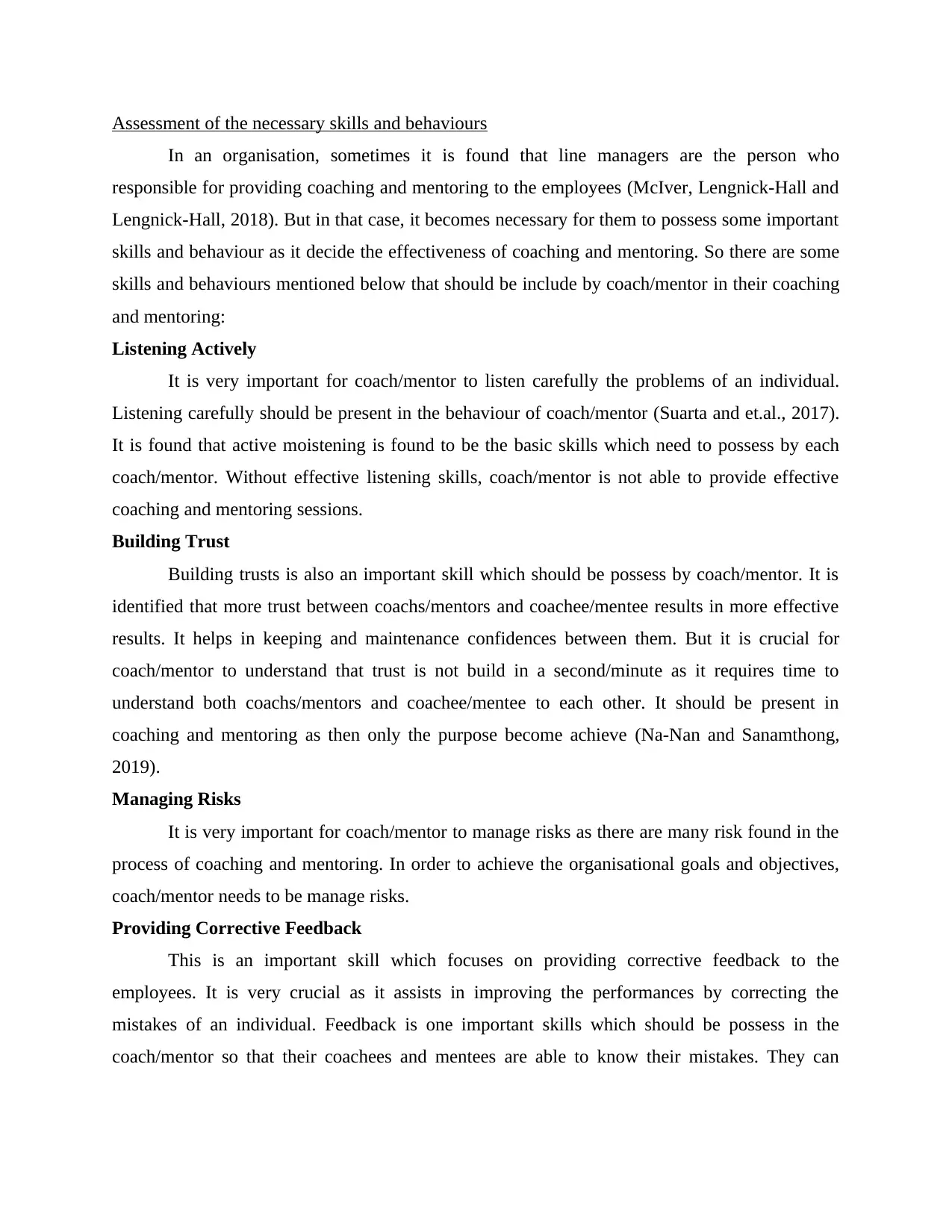
Assessment of the necessary skills and behaviours
In an organisation, sometimes it is found that line managers are the person who
responsible for providing coaching and mentoring to the employees (McIver, Lengnick-Hall and
Lengnick-Hall, 2018). But in that case, it becomes necessary for them to possess some important
skills and behaviour as it decide the effectiveness of coaching and mentoring. So there are some
skills and behaviours mentioned below that should be include by coach/mentor in their coaching
and mentoring:
Listening Actively
It is very important for coach/mentor to listen carefully the problems of an individual.
Listening carefully should be present in the behaviour of coach/mentor (Suarta and et.al., 2017).
It is found that active moistening is found to be the basic skills which need to possess by each
coach/mentor. Without effective listening skills, coach/mentor is not able to provide effective
coaching and mentoring sessions.
Building Trust
Building trusts is also an important skill which should be possess by coach/mentor. It is
identified that more trust between coachs/mentors and coachee/mentee results in more effective
results. It helps in keeping and maintenance confidences between them. But it is crucial for
coach/mentor to understand that trust is not build in a second/minute as it requires time to
understand both coachs/mentors and coachee/mentee to each other. It should be present in
coaching and mentoring as then only the purpose become achieve (Na-Nan and Sanamthong,
2019).
Managing Risks
It is very important for coach/mentor to manage risks as there are many risk found in the
process of coaching and mentoring. In order to achieve the organisational goals and objectives,
coach/mentor needs to be manage risks.
Providing Corrective Feedback
This is an important skill which focuses on providing corrective feedback to the
employees. It is very crucial as it assists in improving the performances by correcting the
mistakes of an individual. Feedback is one important skills which should be possess in the
coach/mentor so that their coachees and mentees are able to know their mistakes. They can
In an organisation, sometimes it is found that line managers are the person who
responsible for providing coaching and mentoring to the employees (McIver, Lengnick-Hall and
Lengnick-Hall, 2018). But in that case, it becomes necessary for them to possess some important
skills and behaviour as it decide the effectiveness of coaching and mentoring. So there are some
skills and behaviours mentioned below that should be include by coach/mentor in their coaching
and mentoring:
Listening Actively
It is very important for coach/mentor to listen carefully the problems of an individual.
Listening carefully should be present in the behaviour of coach/mentor (Suarta and et.al., 2017).
It is found that active moistening is found to be the basic skills which need to possess by each
coach/mentor. Without effective listening skills, coach/mentor is not able to provide effective
coaching and mentoring sessions.
Building Trust
Building trusts is also an important skill which should be possess by coach/mentor. It is
identified that more trust between coachs/mentors and coachee/mentee results in more effective
results. It helps in keeping and maintenance confidences between them. But it is crucial for
coach/mentor to understand that trust is not build in a second/minute as it requires time to
understand both coachs/mentors and coachee/mentee to each other. It should be present in
coaching and mentoring as then only the purpose become achieve (Na-Nan and Sanamthong,
2019).
Managing Risks
It is very important for coach/mentor to manage risks as there are many risk found in the
process of coaching and mentoring. In order to achieve the organisational goals and objectives,
coach/mentor needs to be manage risks.
Providing Corrective Feedback
This is an important skill which focuses on providing corrective feedback to the
employees. It is very crucial as it assists in improving the performances by correcting the
mistakes of an individual. Feedback is one important skills which should be possess in the
coach/mentor so that their coachees and mentees are able to know their mistakes. They can
⊘ This is a preview!⊘
Do you want full access?
Subscribe today to unlock all pages.

Trusted by 1+ million students worldwide
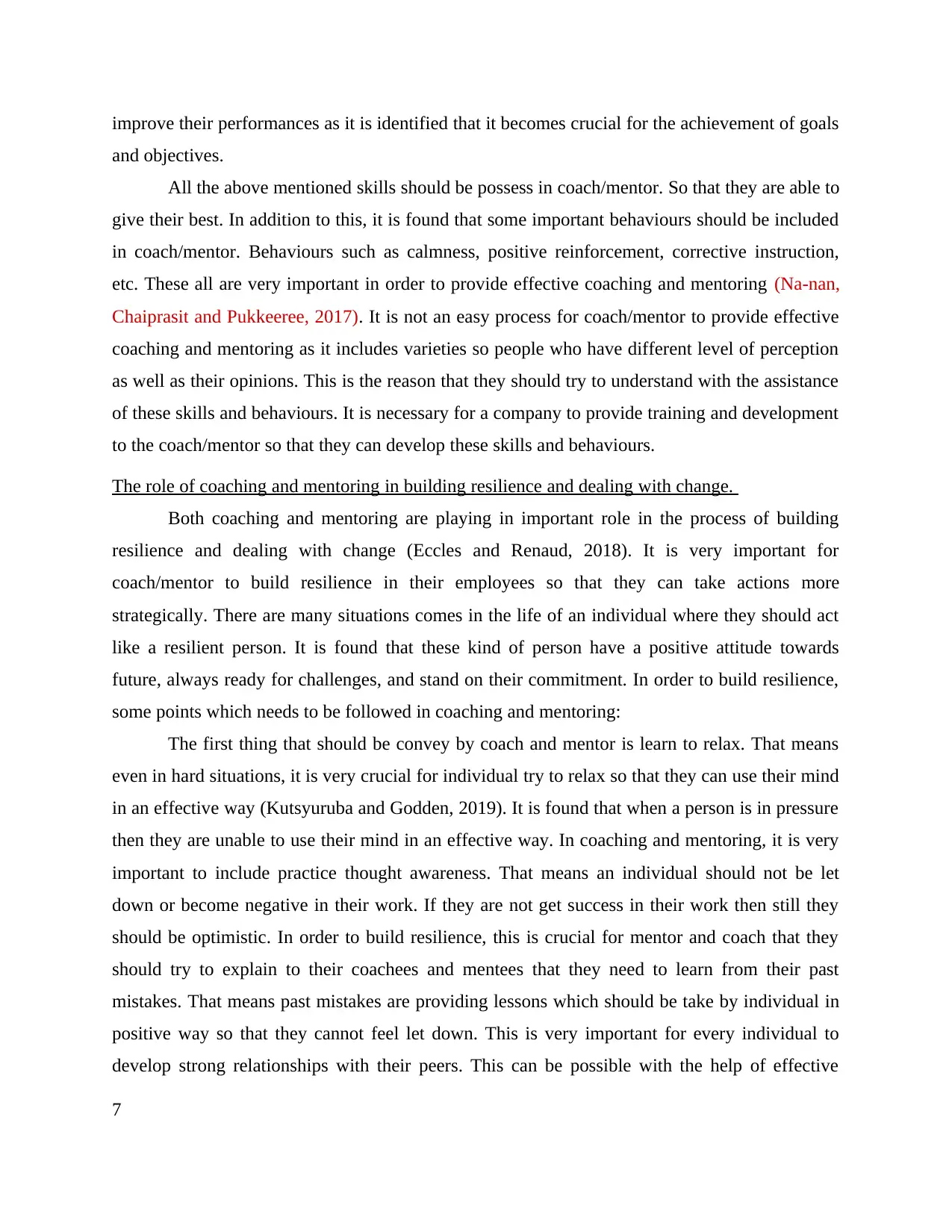
improve their performances as it is identified that it becomes crucial for the achievement of goals
and objectives.
All the above mentioned skills should be possess in coach/mentor. So that they are able to
give their best. In addition to this, it is found that some important behaviours should be included
in coach/mentor. Behaviours such as calmness, positive reinforcement, corrective instruction,
etc. These all are very important in order to provide effective coaching and mentoring (Na-nan,
Chaiprasit and Pukkeeree, 2017). It is not an easy process for coach/mentor to provide effective
coaching and mentoring as it includes varieties so people who have different level of perception
as well as their opinions. This is the reason that they should try to understand with the assistance
of these skills and behaviours. It is necessary for a company to provide training and development
to the coach/mentor so that they can develop these skills and behaviours.
The role of coaching and mentoring in building resilience and dealing with change.
Both coaching and mentoring are playing in important role in the process of building
resilience and dealing with change (Eccles and Renaud, 2018). It is very important for
coach/mentor to build resilience in their employees so that they can take actions more
strategically. There are many situations comes in the life of an individual where they should act
like a resilient person. It is found that these kind of person have a positive attitude towards
future, always ready for challenges, and stand on their commitment. In order to build resilience,
some points which needs to be followed in coaching and mentoring:
The first thing that should be convey by coach and mentor is learn to relax. That means
even in hard situations, it is very crucial for individual try to relax so that they can use their mind
in an effective way (Kutsyuruba and Godden, 2019). It is found that when a person is in pressure
then they are unable to use their mind in an effective way. In coaching and mentoring, it is very
important to include practice thought awareness. That means an individual should not be let
down or become negative in their work. If they are not get success in their work then still they
should be optimistic. In order to build resilience, this is crucial for mentor and coach that they
should try to explain to their coachees and mentees that they need to learn from their past
mistakes. That means past mistakes are providing lessons which should be take by individual in
positive way so that they cannot feel let down. This is very important for every individual to
develop strong relationships with their peers. This can be possible with the help of effective
7
and objectives.
All the above mentioned skills should be possess in coach/mentor. So that they are able to
give their best. In addition to this, it is found that some important behaviours should be included
in coach/mentor. Behaviours such as calmness, positive reinforcement, corrective instruction,
etc. These all are very important in order to provide effective coaching and mentoring (Na-nan,
Chaiprasit and Pukkeeree, 2017). It is not an easy process for coach/mentor to provide effective
coaching and mentoring as it includes varieties so people who have different level of perception
as well as their opinions. This is the reason that they should try to understand with the assistance
of these skills and behaviours. It is necessary for a company to provide training and development
to the coach/mentor so that they can develop these skills and behaviours.
The role of coaching and mentoring in building resilience and dealing with change.
Both coaching and mentoring are playing in important role in the process of building
resilience and dealing with change (Eccles and Renaud, 2018). It is very important for
coach/mentor to build resilience in their employees so that they can take actions more
strategically. There are many situations comes in the life of an individual where they should act
like a resilient person. It is found that these kind of person have a positive attitude towards
future, always ready for challenges, and stand on their commitment. In order to build resilience,
some points which needs to be followed in coaching and mentoring:
The first thing that should be convey by coach and mentor is learn to relax. That means
even in hard situations, it is very crucial for individual try to relax so that they can use their mind
in an effective way (Kutsyuruba and Godden, 2019). It is found that when a person is in pressure
then they are unable to use their mind in an effective way. In coaching and mentoring, it is very
important to include practice thought awareness. That means an individual should not be let
down or become negative in their work. If they are not get success in their work then still they
should be optimistic. In order to build resilience, this is crucial for mentor and coach that they
should try to explain to their coachees and mentees that they need to learn from their past
mistakes. That means past mistakes are providing lessons which should be take by individual in
positive way so that they cannot feel let down. This is very important for every individual to
develop strong relationships with their peers. This can be possible with the help of effective
7
Paraphrase This Document
Need a fresh take? Get an instant paraphrase of this document with our AI Paraphraser
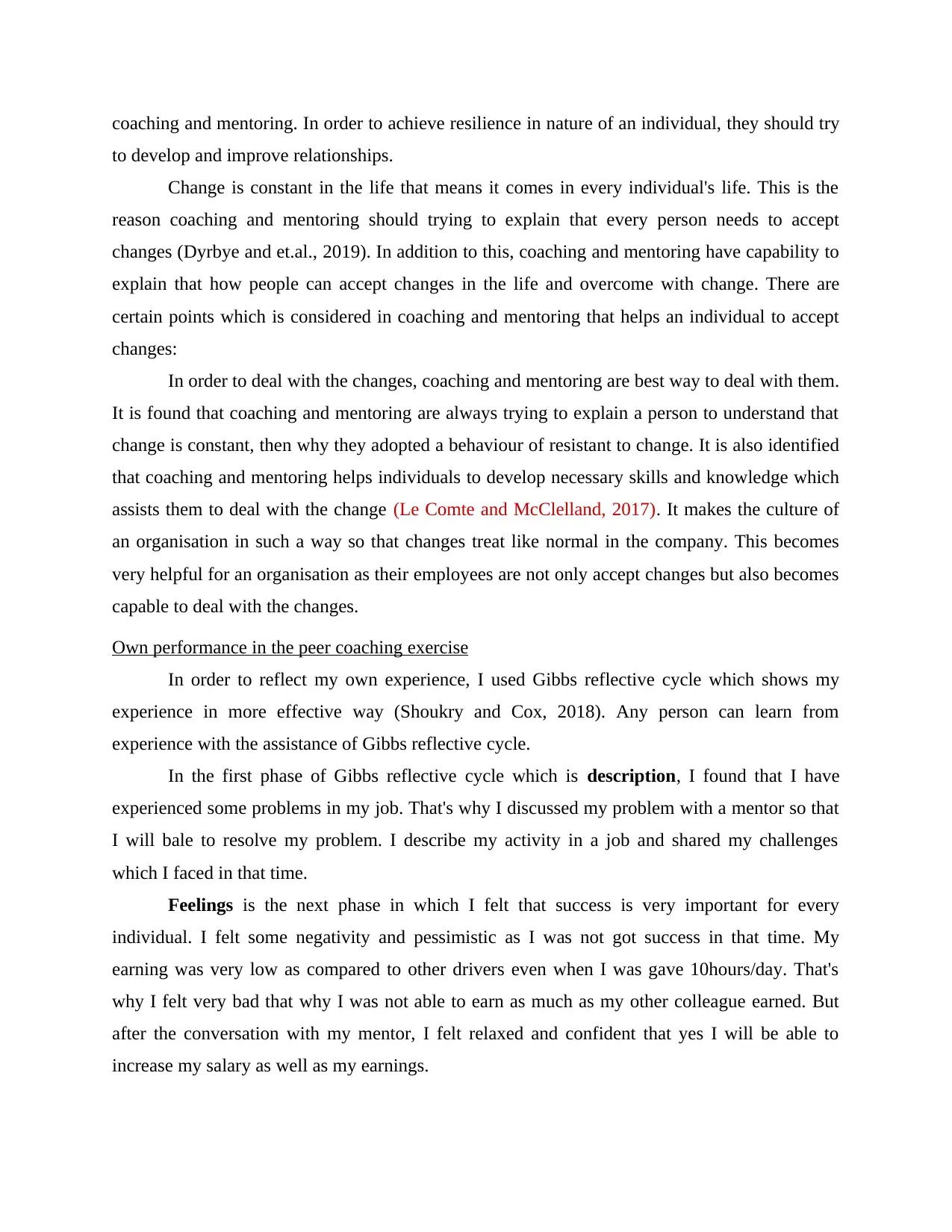
coaching and mentoring. In order to achieve resilience in nature of an individual, they should try
to develop and improve relationships.
Change is constant in the life that means it comes in every individual's life. This is the
reason coaching and mentoring should trying to explain that every person needs to accept
changes (Dyrbye and et.al., 2019). In addition to this, coaching and mentoring have capability to
explain that how people can accept changes in the life and overcome with change. There are
certain points which is considered in coaching and mentoring that helps an individual to accept
changes:
In order to deal with the changes, coaching and mentoring are best way to deal with them.
It is found that coaching and mentoring are always trying to explain a person to understand that
change is constant, then why they adopted a behaviour of resistant to change. It is also identified
that coaching and mentoring helps individuals to develop necessary skills and knowledge which
assists them to deal with the change (Le Comte and McClelland, 2017). It makes the culture of
an organisation in such a way so that changes treat like normal in the company. This becomes
very helpful for an organisation as their employees are not only accept changes but also becomes
capable to deal with the changes.
Own performance in the peer coaching exercise
In order to reflect my own experience, I used Gibbs reflective cycle which shows my
experience in more effective way (Shoukry and Cox, 2018). Any person can learn from
experience with the assistance of Gibbs reflective cycle.
In the first phase of Gibbs reflective cycle which is description, I found that I have
experienced some problems in my job. That's why I discussed my problem with a mentor so that
I will bale to resolve my problem. I describe my activity in a job and shared my challenges
which I faced in that time.
Feelings is the next phase in which I felt that success is very important for every
individual. I felt some negativity and pessimistic as I was not got success in that time. My
earning was very low as compared to other drivers even when I was gave 10hours/day. That's
why I felt very bad that why I was not able to earn as much as my other colleague earned. But
after the conversation with my mentor, I felt relaxed and confident that yes I will be able to
increase my salary as well as my earnings.
to develop and improve relationships.
Change is constant in the life that means it comes in every individual's life. This is the
reason coaching and mentoring should trying to explain that every person needs to accept
changes (Dyrbye and et.al., 2019). In addition to this, coaching and mentoring have capability to
explain that how people can accept changes in the life and overcome with change. There are
certain points which is considered in coaching and mentoring that helps an individual to accept
changes:
In order to deal with the changes, coaching and mentoring are best way to deal with them.
It is found that coaching and mentoring are always trying to explain a person to understand that
change is constant, then why they adopted a behaviour of resistant to change. It is also identified
that coaching and mentoring helps individuals to develop necessary skills and knowledge which
assists them to deal with the change (Le Comte and McClelland, 2017). It makes the culture of
an organisation in such a way so that changes treat like normal in the company. This becomes
very helpful for an organisation as their employees are not only accept changes but also becomes
capable to deal with the changes.
Own performance in the peer coaching exercise
In order to reflect my own experience, I used Gibbs reflective cycle which shows my
experience in more effective way (Shoukry and Cox, 2018). Any person can learn from
experience with the assistance of Gibbs reflective cycle.
In the first phase of Gibbs reflective cycle which is description, I found that I have
experienced some problems in my job. That's why I discussed my problem with a mentor so that
I will bale to resolve my problem. I describe my activity in a job and shared my challenges
which I faced in that time.
Feelings is the next phase in which I felt that success is very important for every
individual. I felt some negativity and pessimistic as I was not got success in that time. My
earning was very low as compared to other drivers even when I was gave 10hours/day. That's
why I felt very bad that why I was not able to earn as much as my other colleague earned. But
after the conversation with my mentor, I felt relaxed and confident that yes I will be able to
increase my salary as well as my earnings.
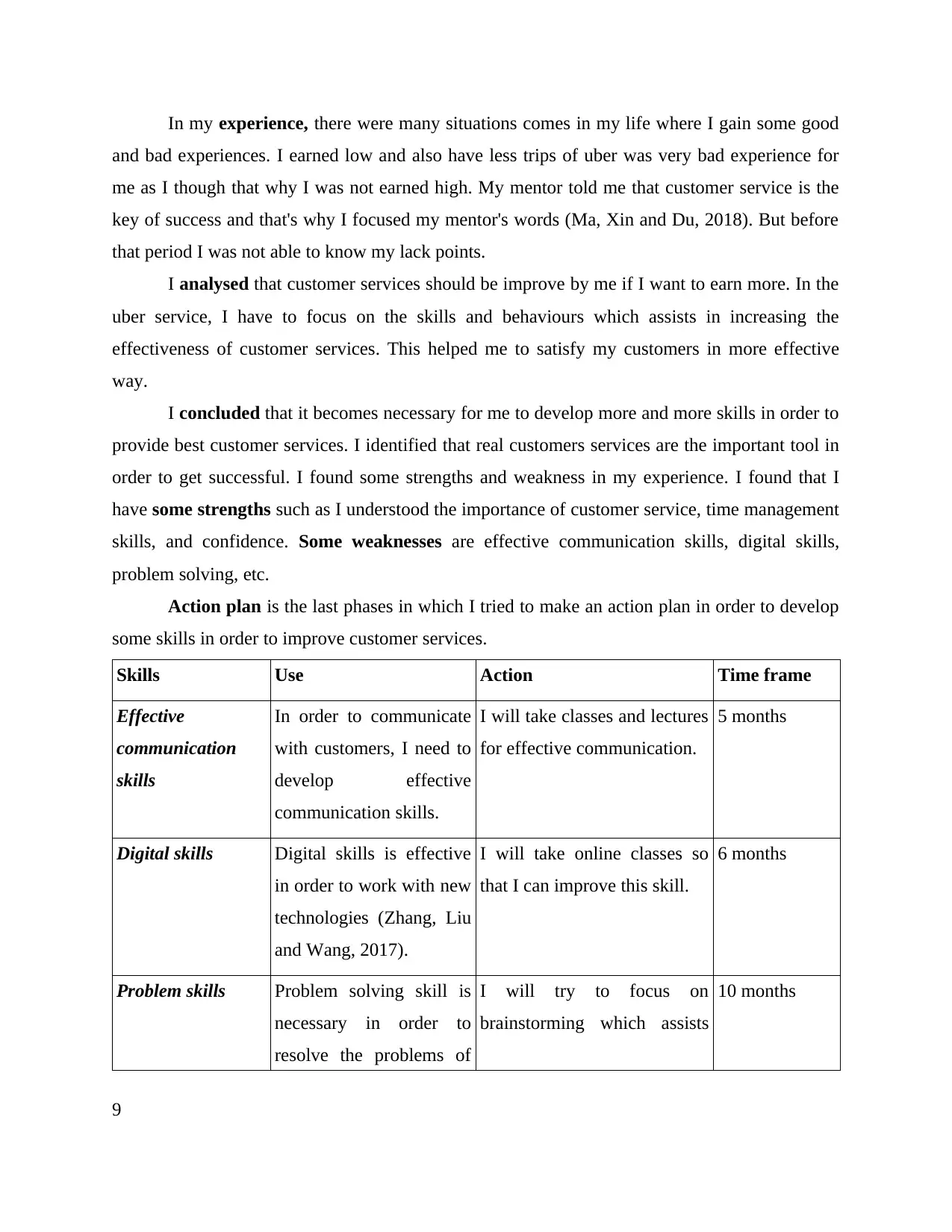
In my experience, there were many situations comes in my life where I gain some good
and bad experiences. I earned low and also have less trips of uber was very bad experience for
me as I though that why I was not earned high. My mentor told me that customer service is the
key of success and that's why I focused my mentor's words (Ma, Xin and Du, 2018). But before
that period I was not able to know my lack points.
I analysed that customer services should be improve by me if I want to earn more. In the
uber service, I have to focus on the skills and behaviours which assists in increasing the
effectiveness of customer services. This helped me to satisfy my customers in more effective
way.
I concluded that it becomes necessary for me to develop more and more skills in order to
provide best customer services. I identified that real customers services are the important tool in
order to get successful. I found some strengths and weakness in my experience. I found that I
have some strengths such as I understood the importance of customer service, time management
skills, and confidence. Some weaknesses are effective communication skills, digital skills,
problem solving, etc.
Action plan is the last phases in which I tried to make an action plan in order to develop
some skills in order to improve customer services.
Skills Use Action Time frame
Effective
communication
skills
In order to communicate
with customers, I need to
develop effective
communication skills.
I will take classes and lectures
for effective communication.
5 months
Digital skills Digital skills is effective
in order to work with new
technologies (Zhang, Liu
and Wang, 2017).
I will take online classes so
that I can improve this skill.
6 months
Problem skills Problem solving skill is
necessary in order to
resolve the problems of
I will try to focus on
brainstorming which assists
10 months
9
and bad experiences. I earned low and also have less trips of uber was very bad experience for
me as I though that why I was not earned high. My mentor told me that customer service is the
key of success and that's why I focused my mentor's words (Ma, Xin and Du, 2018). But before
that period I was not able to know my lack points.
I analysed that customer services should be improve by me if I want to earn more. In the
uber service, I have to focus on the skills and behaviours which assists in increasing the
effectiveness of customer services. This helped me to satisfy my customers in more effective
way.
I concluded that it becomes necessary for me to develop more and more skills in order to
provide best customer services. I identified that real customers services are the important tool in
order to get successful. I found some strengths and weakness in my experience. I found that I
have some strengths such as I understood the importance of customer service, time management
skills, and confidence. Some weaknesses are effective communication skills, digital skills,
problem solving, etc.
Action plan is the last phases in which I tried to make an action plan in order to develop
some skills in order to improve customer services.
Skills Use Action Time frame
Effective
communication
skills
In order to communicate
with customers, I need to
develop effective
communication skills.
I will take classes and lectures
for effective communication.
5 months
Digital skills Digital skills is effective
in order to work with new
technologies (Zhang, Liu
and Wang, 2017).
I will take online classes so
that I can improve this skill.
6 months
Problem skills Problem solving skill is
necessary in order to
resolve the problems of
I will try to focus on
brainstorming which assists
10 months
9
⊘ This is a preview!⊘
Do you want full access?
Subscribe today to unlock all pages.

Trusted by 1+ million students worldwide
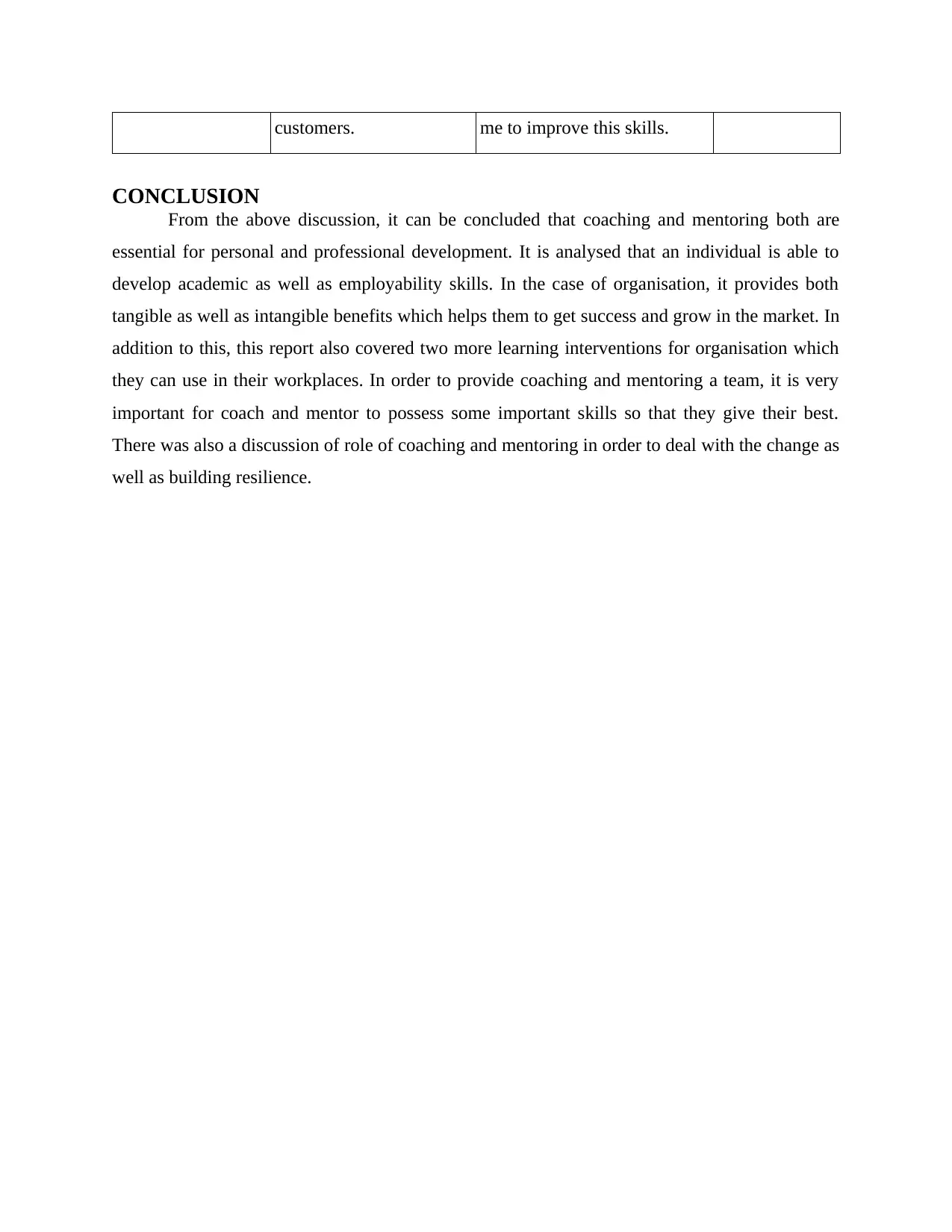
customers. me to improve this skills.
CONCLUSION
From the above discussion, it can be concluded that coaching and mentoring both are
essential for personal and professional development. It is analysed that an individual is able to
develop academic as well as employability skills. In the case of organisation, it provides both
tangible as well as intangible benefits which helps them to get success and grow in the market. In
addition to this, this report also covered two more learning interventions for organisation which
they can use in their workplaces. In order to provide coaching and mentoring a team, it is very
important for coach and mentor to possess some important skills so that they give their best.
There was also a discussion of role of coaching and mentoring in order to deal with the change as
well as building resilience.
CONCLUSION
From the above discussion, it can be concluded that coaching and mentoring both are
essential for personal and professional development. It is analysed that an individual is able to
develop academic as well as employability skills. In the case of organisation, it provides both
tangible as well as intangible benefits which helps them to get success and grow in the market. In
addition to this, this report also covered two more learning interventions for organisation which
they can use in their workplaces. In order to provide coaching and mentoring a team, it is very
important for coach and mentor to possess some important skills so that they give their best.
There was also a discussion of role of coaching and mentoring in order to deal with the change as
well as building resilience.
Paraphrase This Document
Need a fresh take? Get an instant paraphrase of this document with our AI Paraphraser
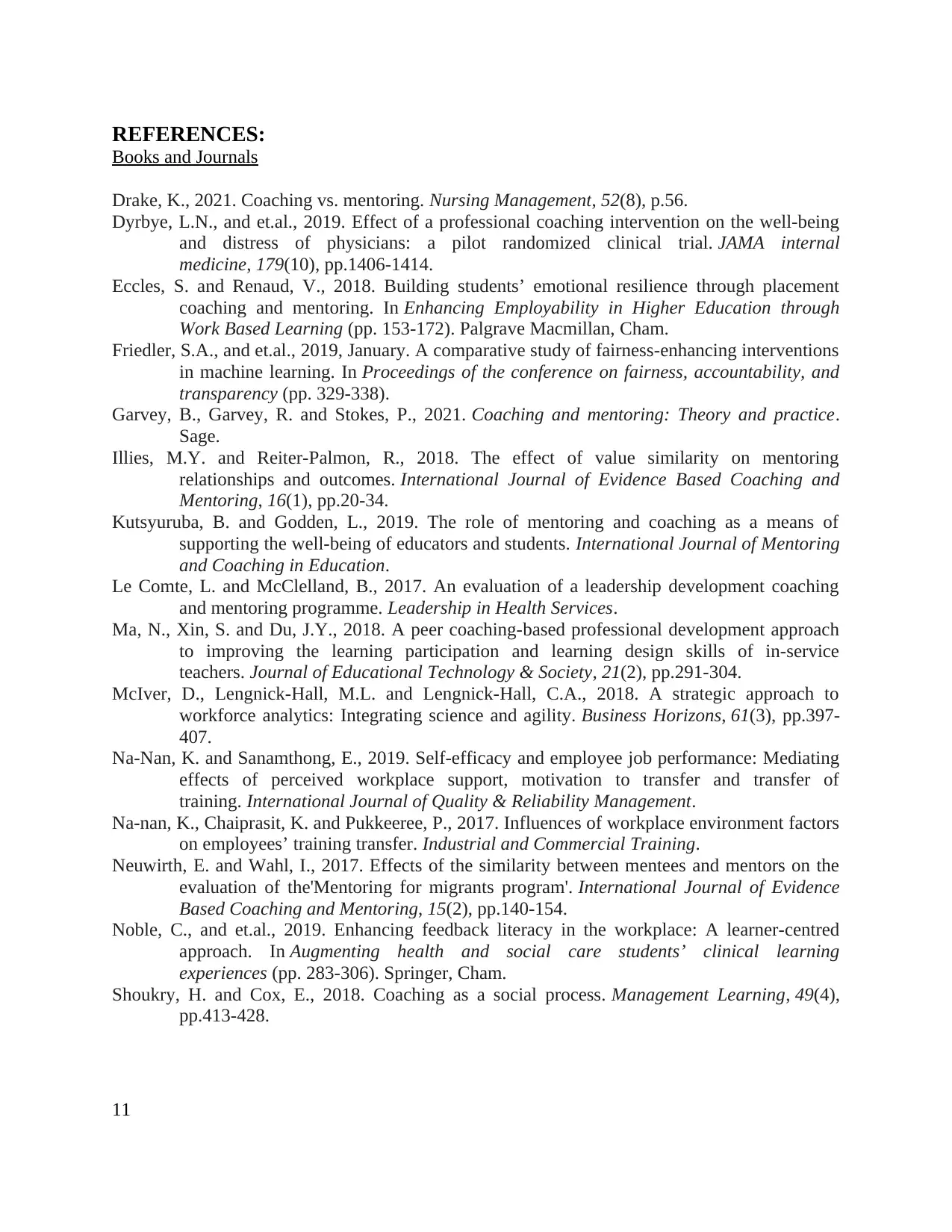
REFERENCES:
Books and Journals
Drake, K., 2021. Coaching vs. mentoring. Nursing Management, 52(8), p.56.
Dyrbye, L.N., and et.al., 2019. Effect of a professional coaching intervention on the well-being
and distress of physicians: a pilot randomized clinical trial. JAMA internal
medicine, 179(10), pp.1406-1414.
Eccles, S. and Renaud, V., 2018. Building students’ emotional resilience through placement
coaching and mentoring. In Enhancing Employability in Higher Education through
Work Based Learning (pp. 153-172). Palgrave Macmillan, Cham.
Friedler, S.A., and et.al., 2019, January. A comparative study of fairness-enhancing interventions
in machine learning. In Proceedings of the conference on fairness, accountability, and
transparency (pp. 329-338).
Garvey, B., Garvey, R. and Stokes, P., 2021. Coaching and mentoring: Theory and practice.
Sage.
Illies, M.Y. and Reiter-Palmon, R., 2018. The effect of value similarity on mentoring
relationships and outcomes. International Journal of Evidence Based Coaching and
Mentoring, 16(1), pp.20-34.
Kutsyuruba, B. and Godden, L., 2019. The role of mentoring and coaching as a means of
supporting the well-being of educators and students. International Journal of Mentoring
and Coaching in Education.
Le Comte, L. and McClelland, B., 2017. An evaluation of a leadership development coaching
and mentoring programme. Leadership in Health Services.
Ma, N., Xin, S. and Du, J.Y., 2018. A peer coaching-based professional development approach
to improving the learning participation and learning design skills of in-service
teachers. Journal of Educational Technology & Society, 21(2), pp.291-304.
McIver, D., Lengnick-Hall, M.L. and Lengnick-Hall, C.A., 2018. A strategic approach to
workforce analytics: Integrating science and agility. Business Horizons, 61(3), pp.397-
407.
Na-Nan, K. and Sanamthong, E., 2019. Self-efficacy and employee job performance: Mediating
effects of perceived workplace support, motivation to transfer and transfer of
training. International Journal of Quality & Reliability Management.
Na-nan, K., Chaiprasit, K. and Pukkeeree, P., 2017. Influences of workplace environment factors
on employees’ training transfer. Industrial and Commercial Training.
Neuwirth, E. and Wahl, I., 2017. Effects of the similarity between mentees and mentors on the
evaluation of the'Mentoring for migrants program'. International Journal of Evidence
Based Coaching and Mentoring, 15(2), pp.140-154.
Noble, C., and et.al., 2019. Enhancing feedback literacy in the workplace: A learner-centred
approach. In Augmenting health and social care students’ clinical learning
experiences (pp. 283-306). Springer, Cham.
Shoukry, H. and Cox, E., 2018. Coaching as a social process. Management Learning, 49(4),
pp.413-428.
11
Books and Journals
Drake, K., 2021. Coaching vs. mentoring. Nursing Management, 52(8), p.56.
Dyrbye, L.N., and et.al., 2019. Effect of a professional coaching intervention on the well-being
and distress of physicians: a pilot randomized clinical trial. JAMA internal
medicine, 179(10), pp.1406-1414.
Eccles, S. and Renaud, V., 2018. Building students’ emotional resilience through placement
coaching and mentoring. In Enhancing Employability in Higher Education through
Work Based Learning (pp. 153-172). Palgrave Macmillan, Cham.
Friedler, S.A., and et.al., 2019, January. A comparative study of fairness-enhancing interventions
in machine learning. In Proceedings of the conference on fairness, accountability, and
transparency (pp. 329-338).
Garvey, B., Garvey, R. and Stokes, P., 2021. Coaching and mentoring: Theory and practice.
Sage.
Illies, M.Y. and Reiter-Palmon, R., 2018. The effect of value similarity on mentoring
relationships and outcomes. International Journal of Evidence Based Coaching and
Mentoring, 16(1), pp.20-34.
Kutsyuruba, B. and Godden, L., 2019. The role of mentoring and coaching as a means of
supporting the well-being of educators and students. International Journal of Mentoring
and Coaching in Education.
Le Comte, L. and McClelland, B., 2017. An evaluation of a leadership development coaching
and mentoring programme. Leadership in Health Services.
Ma, N., Xin, S. and Du, J.Y., 2018. A peer coaching-based professional development approach
to improving the learning participation and learning design skills of in-service
teachers. Journal of Educational Technology & Society, 21(2), pp.291-304.
McIver, D., Lengnick-Hall, M.L. and Lengnick-Hall, C.A., 2018. A strategic approach to
workforce analytics: Integrating science and agility. Business Horizons, 61(3), pp.397-
407.
Na-Nan, K. and Sanamthong, E., 2019. Self-efficacy and employee job performance: Mediating
effects of perceived workplace support, motivation to transfer and transfer of
training. International Journal of Quality & Reliability Management.
Na-nan, K., Chaiprasit, K. and Pukkeeree, P., 2017. Influences of workplace environment factors
on employees’ training transfer. Industrial and Commercial Training.
Neuwirth, E. and Wahl, I., 2017. Effects of the similarity between mentees and mentors on the
evaluation of the'Mentoring for migrants program'. International Journal of Evidence
Based Coaching and Mentoring, 15(2), pp.140-154.
Noble, C., and et.al., 2019. Enhancing feedback literacy in the workplace: A learner-centred
approach. In Augmenting health and social care students’ clinical learning
experiences (pp. 283-306). Springer, Cham.
Shoukry, H. and Cox, E., 2018. Coaching as a social process. Management Learning, 49(4),
pp.413-428.
11
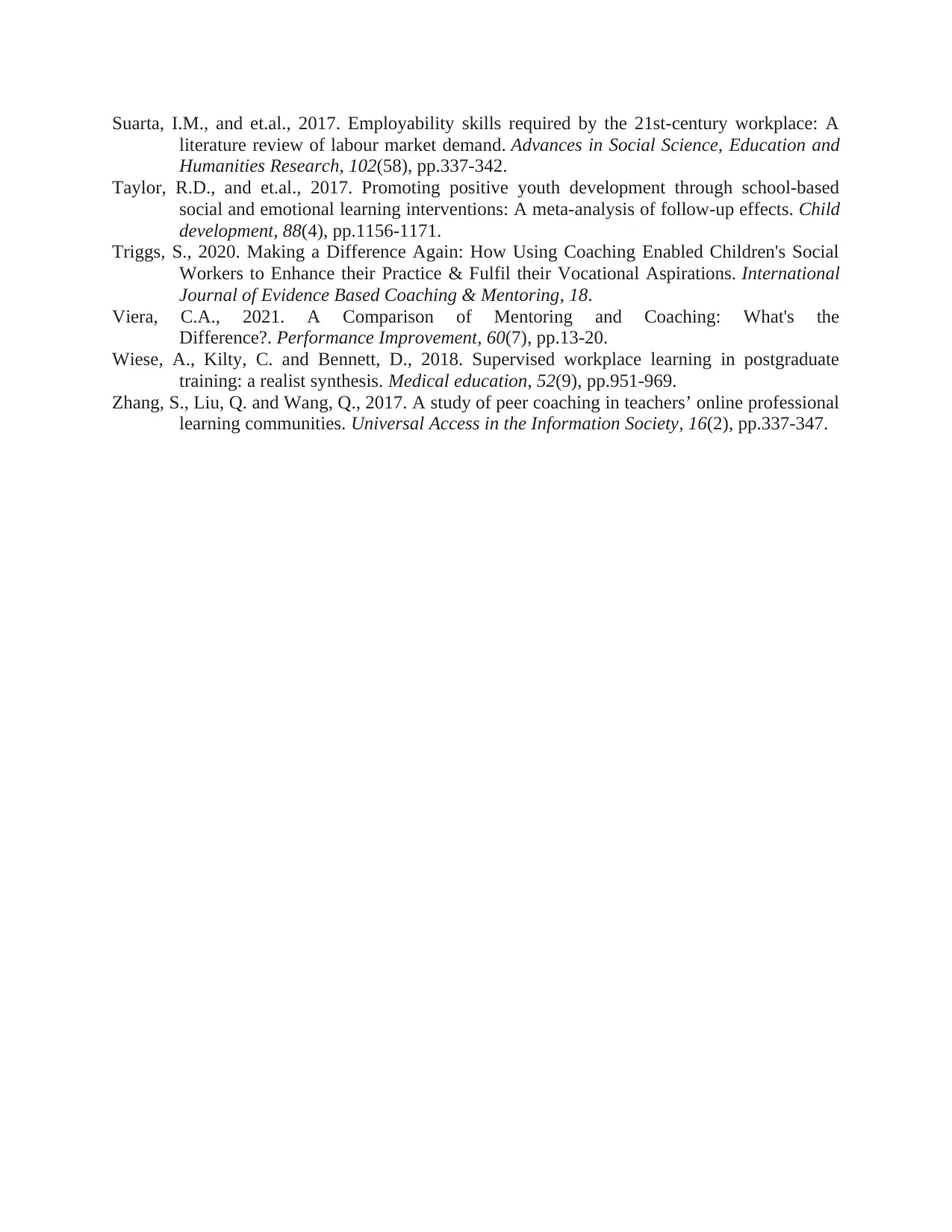
Suarta, I.M., and et.al., 2017. Employability skills required by the 21st-century workplace: A
literature review of labour market demand. Advances in Social Science, Education and
Humanities Research, 102(58), pp.337-342.
Taylor, R.D., and et.al., 2017. Promoting positive youth development through school‐based
social and emotional learning interventions: A meta‐analysis of follow‐up effects. Child
development, 88(4), pp.1156-1171.
Triggs, S., 2020. Making a Difference Again: How Using Coaching Enabled Children's Social
Workers to Enhance their Practice & Fulfil their Vocational Aspirations. International
Journal of Evidence Based Coaching & Mentoring, 18.
Viera, C.A., 2021. A Comparison of Mentoring and Coaching: What's the
Difference?. Performance Improvement, 60(7), pp.13-20.
Wiese, A., Kilty, C. and Bennett, D., 2018. Supervised workplace learning in postgraduate
training: a realist synthesis. Medical education, 52(9), pp.951-969.
Zhang, S., Liu, Q. and Wang, Q., 2017. A study of peer coaching in teachers’ online professional
learning communities. Universal Access in the Information Society, 16(2), pp.337-347.
literature review of labour market demand. Advances in Social Science, Education and
Humanities Research, 102(58), pp.337-342.
Taylor, R.D., and et.al., 2017. Promoting positive youth development through school‐based
social and emotional learning interventions: A meta‐analysis of follow‐up effects. Child
development, 88(4), pp.1156-1171.
Triggs, S., 2020. Making a Difference Again: How Using Coaching Enabled Children's Social
Workers to Enhance their Practice & Fulfil their Vocational Aspirations. International
Journal of Evidence Based Coaching & Mentoring, 18.
Viera, C.A., 2021. A Comparison of Mentoring and Coaching: What's the
Difference?. Performance Improvement, 60(7), pp.13-20.
Wiese, A., Kilty, C. and Bennett, D., 2018. Supervised workplace learning in postgraduate
training: a realist synthesis. Medical education, 52(9), pp.951-969.
Zhang, S., Liu, Q. and Wang, Q., 2017. A study of peer coaching in teachers’ online professional
learning communities. Universal Access in the Information Society, 16(2), pp.337-347.
⊘ This is a preview!⊘
Do you want full access?
Subscribe today to unlock all pages.

Trusted by 1+ million students worldwide
1 out of 12
Related Documents
Your All-in-One AI-Powered Toolkit for Academic Success.
+13062052269
info@desklib.com
Available 24*7 on WhatsApp / Email
![[object Object]](/_next/static/media/star-bottom.7253800d.svg)
Unlock your academic potential
Copyright © 2020–2025 A2Z Services. All Rights Reserved. Developed and managed by ZUCOL.




